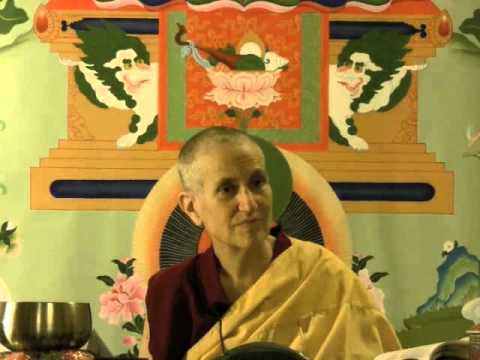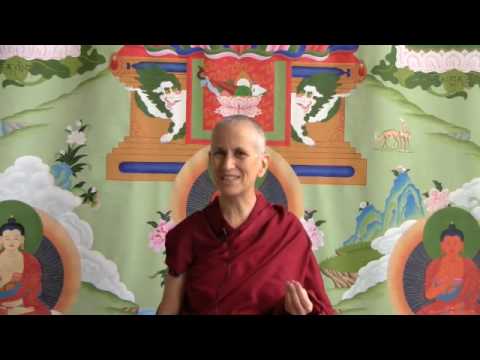Fortitude and joyous effort
Fortitude and joyous effort
Part of a series of Bodhisattva’s Breakfast Corner talks given during the Green Tara Winter Retreat from December 2009 to March 2010.
- When the mind gets weary, and change seems slow, cultivate joyous effort and fortitude
- Even if change seems nonexistent, it does happen. The mind changes gradually.
Green Tara Retreat 046: Fortitude and joyous effort (download)
Sometimes in the middle of retreat, like we are now, people start getting weary because there was the thrill of starting retreat. You start and you have a lot of energy. You really know that you are going to get somewhere. You know that you will have all of these things happen and a deeper understanding [will come]. Then you get to the middle of the retreat and it seems like you are still the same.
Actually you have changed. You cannot help but change. You haven’t realized that your mind has gotten quieter and clearer, but because it has happened in a gradual way. Because of our tendency to focus on what we do not like, rather than on what is going well, it seems like you think, “Oh well, our meditation (is just meditation).”
It is very important to remember that this is a gradual path. There are two very important [practices] of the six far-reaching practices and these two are very important when the mind gets like that. One is fortitude—having the ability to tolerate and endure. Along with that is joyous effort, in other words, you persevere.
In any activity, we have to have the fortitude to keep going, and then to keep going with enthusiasm and perseverance. Otherwise we don’t get anywhere. That is true, isn’t it? Do you remember when, sometimes in first grade, maybe you didn’t do well on your spelling test and you come home with [the thoughts] “I’m quitting school; I’m not going any more.” A first grade dropout! Now you know, thank goodness, our parents didn’t let us do that. They said, “Don’t worry about it, you just keep doing it. Okay, you fall down; you will learn to spell and even if you are not a great speller, there is always spellcheck. Don’t worry.”
The idea is to really have a sense of fortitude and joyous effort so that we can continue on and really see the long-term benefit of what we are doing. That’s why I really stress the bodhicitta motivation—this is that long-term mind. Then [we think],”Oh yes, I keep going. I keep going and every little bit I do is a drop in the bucket. I keep trying and I keep building up that habit.” That is how you get there.
Here is where I think Manjushri, our kitty, is a very good example. When he had to have his leg amputated he didn’t just give up and say, “I am useless, I am never going to walk again.” He just said, “Well cat, there are three paws, not four. Okay, let’s go get some food,” and he hopped along. He continued his life and he learned to walk with three paws and he does reasonably well, don’t you think? It is that whole idea that if you just keep on, and you [continue to] practice and you get better, and you do so with enthusiasm. You can see when you bring out the catnip and you bring out the kitty treats, he has a lot of enthusiasm to get there very quickly. This is the same kind of attitude we want to develop.
Venerable Thubten Chodron
Venerable Chodron emphasizes the practical application of Buddha’s teachings in our daily lives and is especially skilled at explaining them in ways easily understood and practiced by Westerners. She is well known for her warm, humorous, and lucid teachings. She was ordained as a Buddhist nun in 1977 by Kyabje Ling Rinpoche in Dharamsala, India, and in 1986 she received bhikshuni (full) ordination in Taiwan. Read her full bio.


